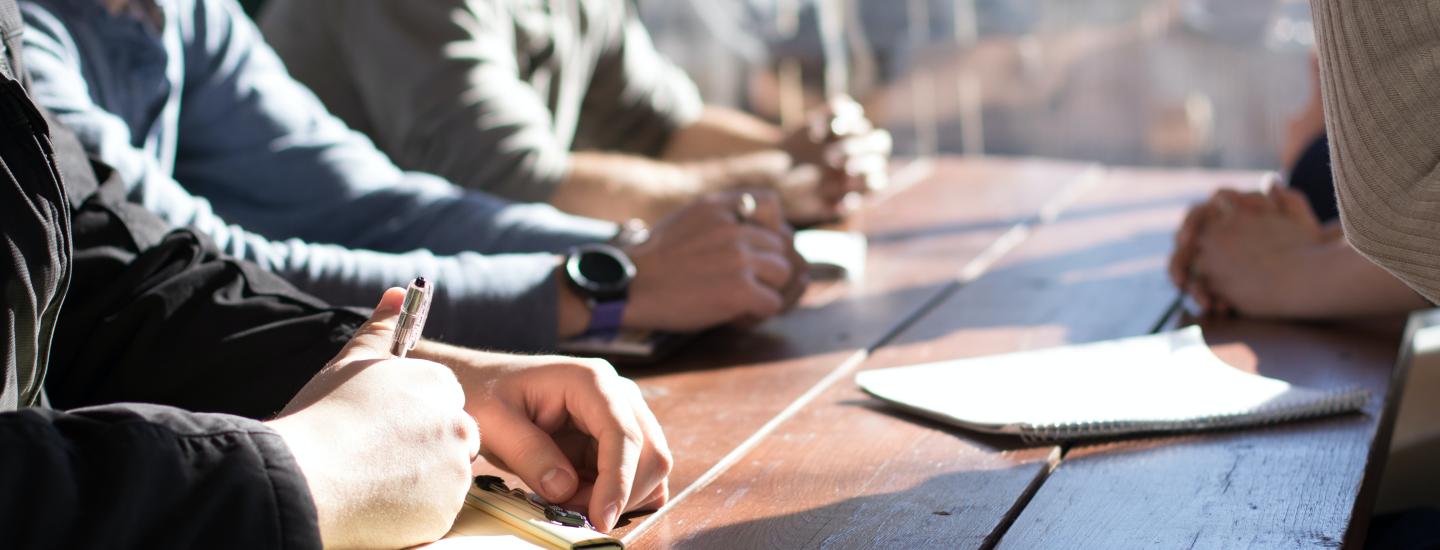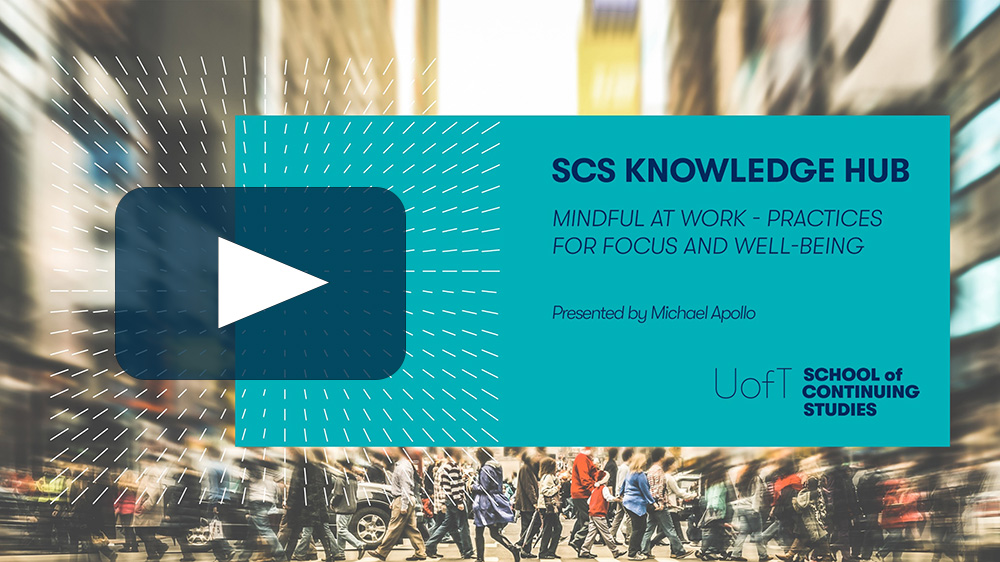
“We need to be adaptable. We need to be able to respond in the moment. And there are some key aspects to this: being able to be resilient, flexible, and to have bounded optimism. So, look to the future with a sense of hope, skillfully, not being blinded by positivity.” - Michael Apollo, SCS Instructor
Mindfulness, and how it can help you succeed in the workplace, was the most recent topic covered by the latest installment of the University of Toronto School of Continuing Studies free Knowledge Hub webinars.
Mindfulness expert and SCS instructor Michael Apollo joined us to discuss current workplace trends, demonstrate a mindfulness pause practice, and demystify mindfulness for those new to the concept.
To begin, Apollo dug into some of the reasons why an interest in mindfulness has been growing, particularly in the past few years, using the acronym VUCA (volatility, uncertainty, complexity, and ambiguity). “These are some of the most stressful things that a human being can endure in the moment,” Apollo explains. “This acronym was created around 15 years ago to articulate the type of experience that an individual goes through in the midst of the fog of war. It has become more and more prominent over the years.”
Apollo asked webinar participants to consider whether most people have had more or less of a VUCA reality over the past five years. “Our landscapes are becoming more turbulent than organizations are becoming resilient to this type of change,” he says.
“This has a definite effect on us. We know there is change happening around the world. You look at political strife, and there are economic realities coming up, it seems with greater rapidity. These changes are affecting us at work, the decisions we make, they’re affecting our stress levels, and affecting the amount of work that we have to do.”
To his point, statistics have shown that about ¾ of people across North America have reported at least one symptom of a mental health condition in the last year. “About 80-90% of staff and workers have found that the past few years have been the most challenging and stressful in their lives,” Apollo says. “For some people, especially those who are knowledge workers, and perhaps in greater positions of privilege, they maybe had a better experience during this time, but for the vast majority of us, it has been a very challenging time. “
At the same time, Apollo adds, there has also been a large migration to people working online or in hybrid work environments. For many of those working online, this has led to an increase in the number of hours on average that they are working.
“I’ve worked with thousands of people since the beginning of the pandemic in different organizations delivering mindfulness programming and something I’ve always found fascinating is, we’ll be working through this training over a period of time and I continually hear about how people feel like they’re not doing enough and feeling bad about the fact that they’re not doing enough when in reality they’re actually doing more,” he says. “And so, this work-life balance as well has shifted and changed and it’s more like work-life blending.”
So how can we manage a work life that is blended into our home life?
Apollo says that to deal well, be well, and work well in the current reality of demanding workplaces where the line between work life and home life might be increasingly blurred, we need to develop our skills in empathy, conflict management, influence, and self awareness.
“Research shows that when we’re faced with stress, these are the first skills that start to degrade,” he explains. “So, what do we do? How can we support ourselves during this time?”
Apollo goes on to reference a study that found that the best predictors of leaders being able to successfully navigate times of crisis or change was not a predefined response plan but behaviours and mindsets that would prevent them from overreacting to yesterday’s developments and help them look ahead.
“We need to be adaptable. We need to be able to respond in the moment. And there are some key aspects to this: being able to be resilient, flexible, and to have bounded optimism. So, look to the future with a sense of hope, skillfully, so not being blinded by positivity. And also having the ability to not get caught up into the ways we’ve been doing things in the past. So how do you develop this ability?
Apollo says this is where mindfulness comes into play. “Mindfulness is one of the most studied behaviour-change training methods. That has evidence-based outcomes, which means the research is showing it’s as effective as coaching, cognitive behavioural therapy, the gold standards that are out there, in cultivating a whole host of benefits within people.
Apollo lists improved resilience, communication, decision making, productivity, negotiation, engagement and decreased sick days and healthcare costs among the evidence-based outcomes of mindfulness.
He goes on to walk participants through an exercise he calls a “mindful pause”, a brief mindfulness exercise, and explains how taking a pause like this during your workday can help to reset, restore and sustain your focus, to cope with stress, and to be more present during tasks and conversations.
“Another great thing is you can always do it as a pause before stepping into work mode and as a pause before shifting out of your work mode.”
Watch the full recording to try out the mindful pause exercise yourself and to learn more about mindfulness and how you can apply it in your workplace by visiting the free SCS Knowledge Hub.

